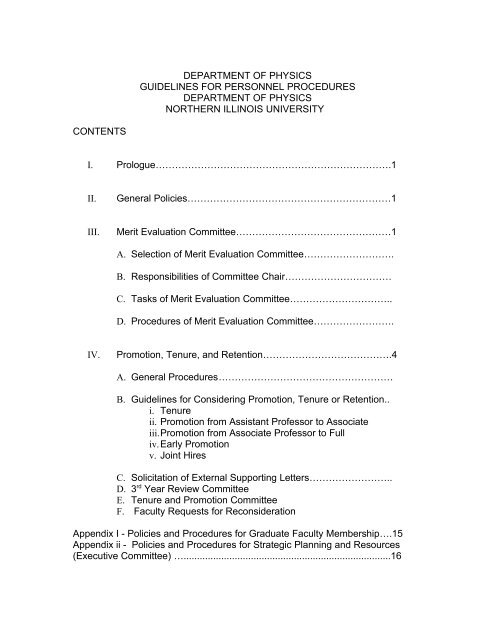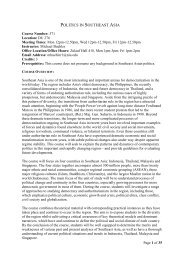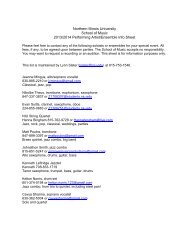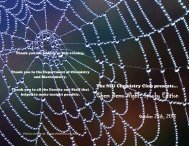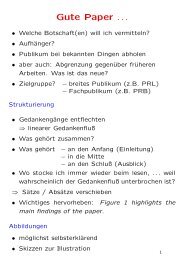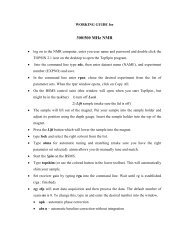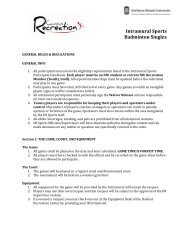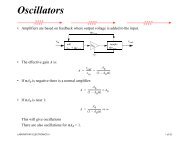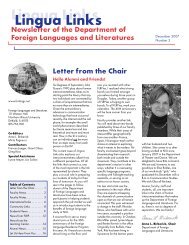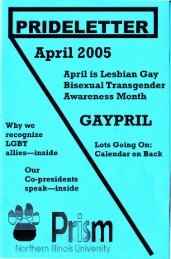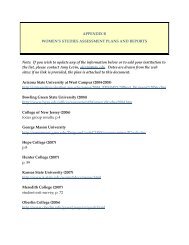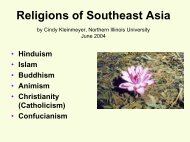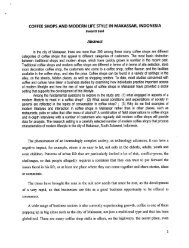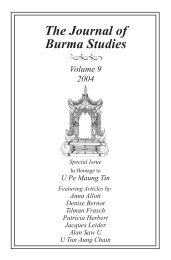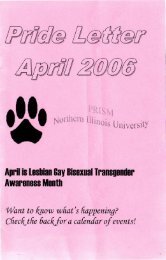Departmental Guidelines for Personnel Procedures
Departmental Guidelines for Personnel Procedures
Departmental Guidelines for Personnel Procedures
Create successful ePaper yourself
Turn your PDF publications into a flip-book with our unique Google optimized e-Paper software.
DEPARTMENT OF PHYSICS<br />
GUIDELINES FOR PERSONNEL PROCEDURES<br />
DEPARTMENT OF PHYSICS<br />
NORTHERN ILLINOIS UNIVERSITY<br />
CONTENTS<br />
I. Prologue……………………………………………………………….1<br />
II.<br />
General Policies………………………………………………………1<br />
III.<br />
Merit Evaluation Committee…………………………………………1<br />
A. Selection of Merit Evaluation Committee……………………….<br />
B. Responsibilities of Committee Chair……………………………<br />
C. Tasks of Merit Evaluation Committee…………………………..<br />
D. <strong>Procedures</strong> of Merit Evaluation Committee…………………….<br />
IV.<br />
Promotion, Tenure, and Retention………………………………….4<br />
A. General <strong>Procedures</strong>………………………………………………<br />
B. <strong>Guidelines</strong> <strong>for</strong> Considering Promotion, Tenure or Retention..<br />
i. Tenure<br />
ii. Promotion from Assistant Professor to Associate<br />
iii.Promotion from Associate Professor to Full<br />
iv. Early Promotion<br />
v. Joint Hires<br />
C. Solicitation of External Supporting Letters……………………..<br />
D. 3 rd Year Review Committee<br />
E. Tenure and Promotion Committee<br />
F. Faculty Requests <strong>for</strong> Reconsideration<br />
Appendix I - Policies and <strong>Procedures</strong> <strong>for</strong> Graduate Faculty Membership….15<br />
Appendix ii - Policies and <strong>Procedures</strong> <strong>for</strong> Strategic Planning and Resources<br />
(Executive Committee) ….............................................................................16
I. PROLOGUE<br />
DEPARTMENT OF PHYSICS<br />
GUIDELINES FOR PERSONNEL PROCEDURES<br />
The procedures of the Department of Physics in matters of merit evaluation (<strong>for</strong><br />
purposes of recommending salary increments), retention and tenure, and<br />
promotion are governed by the <strong>Guidelines</strong> set out by the College of Liberal Arts<br />
and Sciences and the University. Beyond these general policies there are<br />
specific procedures followed by the Department of Physics. These are described<br />
below.<br />
II. GENERAL POLICIES<br />
In any personnel matter under consideration in the Department which indirectly<br />
or directly involves an individual to the extent that his/her participation in the<br />
proceedings could involve a conflict of interest, he/she must abstain from those<br />
proceedings. In no instance may an individual vote on an issue involving his/her<br />
own tenure, retention, or promotion; nor may an individual participate within the<br />
Merit Evaluation Committee in his/her own merit evaluation.<br />
III. MERIT EVALUATION COMMITTEE<br />
A. Selection of Merit Evaluation Committee<br />
Membership on the Merit Evaluation Committee is open to all departmental<br />
faculty on non-administrative regular appointments except representatives to the<br />
College and University Councils. All regular faculty on non-administrative<br />
appointments vote in the election of the Committee. The Department Chair<br />
meets with the Committee as a non-voting member. The Committee is elected in<br />
the following manner:<br />
i. Three members constitute the Committee, two elected each<br />
year; the third, the Chair, returns to the Committee from the<br />
Prior year.<br />
ii.<br />
After serving a term (one or two years) on the Committee, a<br />
faculty member may not serve again until a number of years<br />
equal to that term has passed.<br />
iii. our candidates are chosen by means of a nominating ballot.<br />
Each voting faculty member may vote <strong>for</strong> two from among the<br />
eligible faculty on the nominating ballot. On the final ballot<br />
each faculty member votes <strong>for</strong> one of the candidates. The<br />
individual who receives the largest number of votes is elected<br />
Version approved Physics: 2012-May 3 Page 1
<strong>for</strong> two years and serves as Chair of the Committee in the<br />
following year. The person with the second highest vote total<br />
is elected <strong>for</strong> one year.<br />
iv.<br />
The merit evaluation of the members of the Merit Evaluation<br />
Committee is made by the Department Chair. Any member of<br />
the Committee so evaluated may ask <strong>for</strong> reconsideration by<br />
the Department Chair.<br />
B. Responsibilities of Committee Chair<br />
i. To preside at committee meetings.<br />
ii.<br />
To maintain an accurate record of proceedings and results of<br />
Committee deliberations. Three copies should be retained—<br />
one <strong>for</strong> the Department Office, one <strong>for</strong> the Committee in the<br />
ensuing year, one <strong>for</strong> the Committee Chair’s personal files.<br />
iii. To initiate the solicitation of in<strong>for</strong>mation from faculty relevant<br />
to committee deliberations including Faculty Service Reports,<br />
supporting in<strong>for</strong>mation, and suggested weightings of<br />
categories by individual faculty..Faculty service reports are<br />
due four weeks after being contacted by the committee chair,<br />
or the department, or by January 31 st , whichever is later. If a<br />
faculty does not submit a report, they will be assigned the<br />
lowest score rating in all categories.<br />
iv.<br />
To act as a resource to Merit Evaluation Committees during<br />
later years if deliberations of previous committees are relevant<br />
to their considerations.<br />
C. Tasks of the Merit Evaluation Committee<br />
i. To make annual merit evaluations of the faculty <strong>for</strong> the<br />
purpose of salary increment and adjustment<br />
recommendations, based on three years’ per<strong>for</strong>mance.<br />
ii.<br />
To per<strong>for</strong>m annual written evaluations of non-tenured tenuretrack<br />
faculty and to mentor on progress on tenure. (Note that<br />
the third-year written evaluation of non-tenured tenure track<br />
faculty is per<strong>for</strong>med by a separate Third-year review<br />
committee described later in this document. The merit<br />
committee still per<strong>for</strong>ms merit evaluation in the third year.)<br />
D. <strong>Procedures</strong> of Merit Evaluation Committee<br />
Version approved Physics: 2012-May 3 Page 2
i.<br />
ii.<br />
All internal proceedings are open within the Committee; e.g.,<br />
the merit ratings of faculty by members of the Merit Evaluation<br />
Committee are revealed and, if necessary, defended to the<br />
remainder of the Committee.<br />
When the ratings of faculty per<strong>for</strong>mance of different<br />
Committee members are in major disagreement, every ef<strong>for</strong>t<br />
is made to resolve the discrepancies; if necessary, the Chair<br />
of the Committee solicits additional in<strong>for</strong>mation from the<br />
faculty member whose rating is involved.<br />
iii. In the evaluation of per<strong>for</strong>mance in teaching, student<br />
evaluations, teaching load, the level of the course, student<br />
supervision, and innovations also play important roles.<br />
iv. Published papers, reviews, and books of individual faculty are<br />
given important status in the evaluation of research and<br />
scholarship. These are documented with reprints or copies,<br />
or in the case of work accepted <strong>for</strong> publication but not yet in<br />
print, with preprints and notifications of acceptance.<br />
v. Faculty members are provided access to the Faculty Services<br />
Reports of all members of the Department. These are kept in<br />
the Department Office and may be examined there by the<br />
faculty members.<br />
vi. After the Merit Evaluation Committee has completed its initial<br />
ratings and weightings, the Department Chair makes<br />
independent evaluations and indicates to the Committee all<br />
instances in which his/her evaluations disagree with those of<br />
the Committee. Every ef<strong>for</strong>t is made to resolve major<br />
disagreements between the Committee’s evaluations and<br />
those of the Department Chair.<br />
vii. Faculty members have the right to appear be<strong>for</strong>e the Merit<br />
Evaluation Committee to request reconsideration of their<br />
ratings and weightings after the initial evaluations by the<br />
Committee have been made.<br />
viii. Be<strong>for</strong>e and after reconsideration, the Merit Evaluation<br />
Committee provides each faculty member a compilation of the<br />
merit ratings in each category <strong>for</strong> the entire membership of<br />
the Department including the overall evaluations. No names<br />
are given and the ratings of each individual receiving the<br />
compilation is indicated on the copy he/she receives.<br />
Version approved Physics: 2012-May 3 Page 3
ix. After reconsideration has been completed by the Committee,<br />
each faculty member is given a copy of his/her evaluation<br />
<strong>for</strong>m which is sent to the College Office.<br />
x. Normally the weights <strong>for</strong> teaching, research, and professional<br />
service are 40%, 40%, and 20%, respectively. However, at<br />
the initiation of either the Committee or an individual faculty<br />
member, other weights may be negotiated between the<br />
Committee and the individual. In no case may the weight <strong>for</strong><br />
teaching or research be less than 20%, nor the weight <strong>for</strong><br />
service be less than 10%.<br />
xi. Each untenured tenure-track faculty member meets every<br />
year with the Merit Evaluation Committee to discuss his or her<br />
latest annual merit ratings and progress toward tenure, and to<br />
receive advance warning of any possible changes in<br />
departmental plans that could have a bearing on this person’s<br />
possibility of gaining tenure. A summary statement of the<br />
Merit Evaluation Committee’s annual assessment of progress<br />
toward tenure is provided to each untenured tenure-track<br />
faculty member sequent to these meetings. The Merit<br />
Evaluation Committee shall have available all previous annual<br />
assessments of untenured tenure-track faculty members, and<br />
their annual evaluation should reflect their assessment of the<br />
faculty members progress towards tenure to date.<br />
xii. Merit reviews <strong>for</strong> faculty on sabbatical follow the University<br />
guidelines as listed in the NIU bylaws, section 6.25 (Merit<br />
ratings of persons who have been on leave)<br />
IV. PROMOTION, TENURE, AND RETENTION<br />
A. General <strong>Procedures</strong><br />
Recommendations regarding matters of tenure and retention are made by the<br />
tenured faculty in caucus. Recommendations on promotion to a particular<br />
academic rank are made in caucus by the faculty members holding equivalent or<br />
higher rank.<br />
It is the responsibility of the Department Chair to call together <strong>for</strong> meetings the<br />
faculty groups who recommend upon individual cases of tenure, retention or<br />
promotion. It is the Department Chair’s responsibility to chair these meetings<br />
and to provide data regarding eligibility, time in rank, and general policies of the<br />
Version approved Physics: 2012-May 3 Page 4
institution regarding tenure, promotion, and retention. In each case the<br />
Department Chair submits an independent evaluation.<br />
Consideration of promotion or tenure <strong>for</strong> any department member can be initiated<br />
by the member, by the Chair of the Department, or by the Tenure and Promotion<br />
committee. Consideration <strong>for</strong> retention is initiated by the Merit Evaluation or the<br />
3 rd year Review committee. A recommendation from the committees must be by<br />
majority vote.<br />
With the help of the Department Chair, the candidate then produces the<br />
necessary supporting documents. Also, as discussed below, the Department<br />
Chair initiates the solicitation of letters from external sources.<br />
Upon the availability of the internal and external supporting material, and the<br />
summary report or recommendation from the appropriate committee if available,<br />
the qualified faculty members meet to discuss it. Ideally, a first meeting during<br />
which the person’s qualifications are discussed should be followed by a second,<br />
later meeting where the vote is taken. All qualified faculty members are expected<br />
to attend, either in person or via telepresence; nonattendance at the meeting at<br />
which the vote is taken will count by default as a vote against the candidate.<br />
Following the discussion an open vote is taken on the promotion or tenure<br />
request. Proxy votes are not permitted. A two-thirds vote of all qualified<br />
members of the department is required <strong>for</strong> departmental approval.<br />
For a request <strong>for</strong> promotion to Associate Professor, all members at the rank of<br />
Associate or Full Professor are considered qualified. For requests <strong>for</strong> promotion<br />
to Full Professor, all members at the rank of Full Professor are considered<br />
qualified. For a request <strong>for</strong> tenure, all tenured faculty are considered qualified.<br />
The chair of the department has an independent vote on tenure and promotion,<br />
and there<strong>for</strong>e does not vote with the department and is not counted as a qualified<br />
member <strong>for</strong> purposes of calculating the necessary two-thirds vote.<br />
Persons on official leave or with full-time administrative appointments outside the<br />
department are not considered qualified members of the faculty <strong>for</strong> purposes of<br />
voting on tenure or promotion cases unless they have been actively involved with<br />
the department during the evaluation period of the candidate. In this case,<br />
advance approval from the chair and a majority of the executive committee is<br />
required in order to be part of the voting caucus. Persons unable to attend the<br />
voting meeting due to un<strong>for</strong>eseen emergencies may be removed from the count<br />
of qualified faculty with approval from the chair and a majority of the executive<br />
committee.<br />
Requests <strong>for</strong> promotion from Assistant to Associate Professor are considered no<br />
earlier than the second year as Assistant Professor unless it was stated<br />
otherwise in the initial appointment of that faculty member. Requests <strong>for</strong><br />
promotion from Associate to Full Professor are considered no earlier than the<br />
second year as Associate Professor unless it was stated otherwise in the initial<br />
Version approved Physics: 2012-May 3 Page 5
appointment of that faculty member. Requests <strong>for</strong> tenure are considered no<br />
earlier than the second year as an untenured faculty member unless it was<br />
stated otherwise in the initial appointment of that faculty member.<br />
B. <strong>Guidelines</strong> <strong>for</strong> Considering Promotion, Tenure or Retention<br />
i. Tenure<br />
Under all but exceptional circumstances, the criteria <strong>for</strong> tenure considerations are<br />
identical to those <strong>for</strong> promotion. That is, the criteria <strong>for</strong> tenure of an Associate<br />
Professor are identical to the criteria <strong>for</strong> promotion from Assistant Professor to<br />
Associate Professor. The criteria <strong>for</strong> tenure of a Full Professor are identical to<br />
the criteria <strong>for</strong> promotion from Associate Professor to Full Professor. These<br />
criteria are given in the next section.<br />
ii. Promotion from Assistant Professor to Associate Professor<br />
A candidate <strong>for</strong> promotion to the rank of Associate Professor shall have<br />
successfully developed an independent research program and demonstrated<br />
excellence in teaching and instruction. The promotion and tenure committee will<br />
consider Service contributions to the Department and University favorably.<br />
With respect to scholarly activity, the candidate should have demonstrated the<br />
ability to pursue independent research and is expected to have made consistent<br />
and significant progress towards a national reputation in his or her field as<br />
demonstrated by:<br />
a) Excellence in his or her publication record and rate in leading<br />
refereed physics and related journals either as a single author<br />
or as a principal author with significant contributions. The<br />
journals shall be appropriate <strong>for</strong> the candidate’s discipline(s).<br />
b) Presentation of invited talks at major physics conferences or<br />
workshops at national and international venues.<br />
c) Application <strong>for</strong> external grants or, preferably, successful<br />
acquisition of external funds, especially acquisition of one or<br />
more external peer-reviewed grants.<br />
The scholarly record should also show potential <strong>for</strong> sustained publication<br />
productivity and conference participation as well as grant activity.<br />
With respect to educational activity, the candidate should have demonstrated<br />
excellence in instruction as indicated by regular classroom assessment<br />
Version approved Physics: 2012-May 3 Page 6
(described below) and by participation in activities strengthening the<br />
Department’s academic mission, which can include but are not limited to:<br />
a) Curricular development <strong>for</strong> courses and laboratory exercises.<br />
b) Advising graduate students through degree completion.<br />
c) Mentoring of undergraduates in research programs or capstone<br />
experiences.<br />
d) Development of the <strong>Departmental</strong> educational web-presence or<br />
of on-line instruction.<br />
e) Adoption of research-validated instructional methods.<br />
f) Participation in assessment activities such as M.S.<br />
comprehensive and Ph.D. qualifier examinations.<br />
The candidate’s classroom per<strong>for</strong>mance shall be assessed by observation of<br />
classroom or instructional laboratory presentations in each year preceding the<br />
candidate’s promotion or tenure consideration. The assessment will be<br />
conducted by the Chair and one other tenured faculty member chosen by the<br />
candidate. The visitors will each write a brief summary evaluation of the<br />
candidate’s teaching ability and technique. The evaluation will be available to the<br />
appropriate faculty caucus at the time of consideration of promotion and/or<br />
tenure of the candidate. These evaluations will also be made available to the<br />
relevant committees <strong>for</strong> the purposes of the annual evaluation of the candidate’s<br />
progress toward tenure and promotion and consideration of retention. The<br />
summary evaluations will be provided to the candidate each year prior to the<br />
promotion and/or tenure decision.<br />
The candidate should have demonstrated a willingness to per<strong>for</strong>m service to the<br />
department and university commensurate with the candidate’s current rank.<br />
iii.)<br />
From Associate Professor to Full Professor<br />
A candidate <strong>for</strong> promotion to the rank of Full Professor shall have successfully<br />
developed and maintained an independent research program, demonstrated<br />
leadership in their discipline, demonstrated excellence in teaching and<br />
instruction, and made significant service contributions to the Department and<br />
University.<br />
With respect to scholarly activity, the candidate should have established a<br />
sustainable research ef<strong>for</strong>t and achieved a national or international reputation in<br />
his or her field as demonstrated in all of the following areas:<br />
Version approved Physics: 2012-May 3 Page 7
a)<br />
Excellence in his or her publication record and rate in leading<br />
refereed physics and related journals either as a single author or<br />
as a principal author with significant contributions. The journals<br />
shall be appropriate <strong>for</strong> the candidate’s discipline(s).<br />
b) Presentation of invited talks at major physics conferences or<br />
workshops at national and international venues.<br />
c) Regular receipt of external grants, especially peer-reviewed<br />
grants.<br />
d) Participation in activities indicative of leadership in his or her<br />
field, such as organization of symposia, conferences, or working<br />
groups at major workshops; membership in physics reviews or<br />
on advisory panels; or leadership roles in multi-institution<br />
collaborations.<br />
The scholarly record should show potential <strong>for</strong> sustained productivity<br />
in all areas.<br />
With respect to educational activity, the candidate should have<br />
demonstrated excellence in instruction as indicated by recent<br />
classroom assessment (described below) and by participation in<br />
activities strengthening the Department’s academic mission. The<br />
candidate must have supervised at least one thesis or dissertation in<br />
physics to completion and have contributed significantly to several<br />
other pedagogical areas, which may include but are not limited to:<br />
a) Curricular development <strong>for</strong> courses and laboratory exercises.<br />
b) Mentoring of undergraduates in research programs or capstone<br />
experiences.<br />
c) Development of the <strong>Departmental</strong> educational web-presence or<br />
of on-line instruction.<br />
d) Adoption of research-validated instructional methods.<br />
e) Participation in assessment activities such as M.S.<br />
comprehensive and Ph.D. qualifier examinations.<br />
The candidate’s classroom per<strong>for</strong>mance shall be assessed by<br />
observation of classroom or instructional laboratory presentations in<br />
the year preceding the candidate’s promotion. The assessment will<br />
Version approved Physics: 2012-May 3 Page 8
e conducted by the Chair and one other tenured faculty member<br />
chosen by the candidate. The visitors will each write a brief summary<br />
evaluation of the candidate’s teaching ability and technique. The<br />
evaluation will be available to the appropriate faculty caucus at the<br />
time of consideration of promotion and/or tenure of the candidate. The<br />
summary evaluation will be provided to the candidate prior to the<br />
promotion and/or tenure decision.<br />
With respect to service contributions, the candidate should have<br />
made significant contributions to the Department and University as<br />
can be demonstrated by:<br />
a) Membership in and leadership of <strong>Departmental</strong> or University<br />
Committees.<br />
b) Participation in university-wide planning exercises.<br />
c) Service in significant administrative roles.<br />
d) Participation in public outreach that promotes the mission of the<br />
Department or University.<br />
iv.<br />
Early Promotion and/or Tenure <strong>Guidelines</strong><br />
Candidates <strong>for</strong> early promotion and/or tenure must demonstrate<br />
excellence in research and teaching and have service contributions to<br />
the Department or University and profession commensurate with the<br />
promotion levels as noted in guidelines above. The candidates must<br />
have fully met expectations <strong>for</strong> research productivity with proven<br />
publication, presentation, and funding records. The candidates must<br />
also have excellent classroom assessments as well as made distinct<br />
contributions to the wider academic mission. Furthermore, early<br />
promotion requires significantly greater productivity and<br />
accomplishment than that expected <strong>for</strong> successful promotion on the<br />
typical timescale.<br />
v. Joint Appointments<br />
Department expectations <strong>for</strong> achievement and ef<strong>for</strong>t in scholarship,<br />
teaching, and service as outlined in earlier sections are retained <strong>for</strong><br />
joint appointments. Department tenure and promotion guidelines<br />
provide wide flexibility to acknowledge that endeavors outside the<br />
department may be used demonstrate similar accomplishment and<br />
commitment, particularly in the areas of teaching and service.<br />
Version approved Physics: 2012-May 3 Page 9
The department requires that research and scholarship activities<br />
during the joint appointment period will have clearly acknowledged the<br />
candidate's NIU/physics professional affiliation or co-affiliation if they<br />
are also submitted to the department by the candidate to support<br />
his/her tenure, promotion, or merit evaluations. As examples, this<br />
includes the affiliations of the faculty member as listed on any papers,<br />
presentations, reports, and submitted and funded proposals.<br />
If the candidate loses the external (outside of physics) portion of their<br />
joint appointment be<strong>for</strong>e or during the 5 th year, the candidate, the<br />
chair, and the Third Year Review Committee shall meet and clarify<br />
expectations <strong>for</strong> the candidate's promotion and tenure in light of their<br />
changed circumstances. If a third year review committee has not been<br />
constituted, a committee shall be constituted according to the same<br />
rules <strong>for</strong> this purpose.<br />
C. Solicitation of External Evaluation Letters<br />
Upon receipt of any request <strong>for</strong> promotion or tenure, the Chair of the<br />
Department solicits letters from sources external to the University.<br />
These sources should be individuals with national and international<br />
reputations in the field of the person requesting promotion or tenure.<br />
In each case, at least four such letters are required. The selection of<br />
external sources is done by the Department Chair upon receiving<br />
advice from other members of the department and in consultation with<br />
the candidate. The final choice of evaluators should remain<br />
anonymous to the candidate. The candidate and faculty may not<br />
initiate contact to potential or known sources with intent to influence or<br />
alter the evaluation. External sources should not include <strong>for</strong>mer<br />
advisors or employers of the candidate. However, <strong>for</strong> candidates in<br />
fields which engage in large, multi-institution collaborations, it is<br />
acceptable to solicit letters from senior members of collaborations in<br />
which the candidate has participated.<br />
D. Third-year Review committee<br />
A Recommendation to the department <strong>for</strong> non-retention of a non-tenured<br />
tenure-track faculty may be initiated by a majority vote of the Merit evaluation<br />
Committee during any of its annual merit evaluations and assessments of an<br />
non-tenured tenure-track faculty member. However, the Third-year Review<br />
committee, as outlined in this section, will be <strong>for</strong>med to evaluate rigorously<br />
non-tenured tenure-track faculty's progress towards tenure and promotion at<br />
Version approved Physics: 2012-May 3 Page 10
the third-year, (or equivalent based on hiring letter or memorandum of<br />
understanding). This committee presents a summary of their evaluation along<br />
with advising the department on a recommendation <strong>for</strong> retention or nonretention.<br />
The requirements <strong>for</strong> faculty eligibility to vote and participate in a faculty<br />
meeting on retention are identical to those outlined in the promotion and<br />
tenure sections <strong>for</strong> a decision of tenure, with the following change, a twothirds<br />
majority vote of the eligible faculty quorum is required <strong>for</strong> a decision to<br />
not retain a probationary tenure-track faculty member. The chair of the<br />
department votes with the department and is counted as a qualified member<br />
<strong>for</strong> purposes of calculating the two-thirds vote.<br />
Retention decisions focus primarily on whether the candidate has<br />
demonstrated satisfactory progress in scholarship, teaching, and service on<br />
the time-table required <strong>for</strong> the eventual tenure and promotion. Unsatisfactory<br />
progress may result in a recommendation <strong>for</strong> non-retention. In addition, a<br />
preponderance of evidence suggesting unethical or unprofessional behavior<br />
will result in a recommendation <strong>for</strong> non-retention.<br />
i. Selection of the Third-year Review Committee<br />
1. The Third-year review committee is a 4 member committee<br />
representative of the tenured faculty, and should be chosen no later<br />
than the last two weeks of the Fall semester of the 3 rd academic year<br />
of the candidate. The selected committee will per<strong>for</strong>m the third year<br />
reviews <strong>for</strong> all candidates up <strong>for</strong> review in that academic year.<br />
2. Faculty eligible <strong>for</strong> service on the committee are limited to tenured fulltime<br />
faculty who are not on leave or administrative leave during the<br />
semester of the review and evaluation process.<br />
3. A majority vote (by written or email ballot) of all tenured and untenured<br />
tenure-track faculty is used to elect three committee members. Be<strong>for</strong>e<br />
choosing committee members, the faculty should be in<strong>for</strong>med of the<br />
candidates likely to be reviewed.<br />
4. At least two members of the committee must be tenured full professors<br />
and at least one member (who may be one of the tenured full<br />
professors noted) must be a member of the graduate faculty.<br />
5. The department chair appoints the 4th member and any additional<br />
members as required to satisfy the minimum required number of<br />
tenured full professors and graduate faculty.<br />
Version approved Physics: 2012-May 3 Page 11
6. The spokesperson <strong>for</strong> the committee is chosen by the department<br />
chair from among the elected and appointed members of the<br />
committee.<br />
ii. Evaluation activities of the Retention Committee<br />
1. The committee will be given access to the candidate's service reports<br />
<strong>for</strong> the current and preceding years, annual evaluation and/or<br />
mentoring letters from the Merit committee, the annual assessment of<br />
teaching, the letter of hire and any relevant memorandums of<br />
understanding, and the teaching evaluation scores.<br />
2. The candidate may prepare, if he or she desires, an appendix to the<br />
normal yearly service report that is written specifically <strong>for</strong> the<br />
committee. This appendix is due to the Third year review committee on<br />
the same deadline as the normal service reports to the Merit<br />
committee.<br />
3. During the evaluation year, the members should observe at least one<br />
class session of the candidate's.<br />
4. The candidate is required to present one colloquium during the<br />
academic year of the review, and the members should attend this<br />
colloquium.<br />
5. The evaluation report may clarify department expectations by providing<br />
specific goals and activities that the candidate is requested to achieve<br />
in future to demonstrate adequate progress to tenure and/or<br />
promotion.<br />
6. It is expected that the committee will have a written evaluation report<br />
completed by March 31 of the academic year of the evaluation.<br />
7. The report and committee's recommendation based on the report will<br />
be <strong>for</strong>warded to the chair. The chair will provide a final version of the<br />
report along with the department's recommendation of retention or<br />
non-retention to the candidate.<br />
E. Tenure and Promotion Committee<br />
The responsibility of a tenure and promotion committee is to provide additional<br />
depth and rigor to the department's assessment of a candidate <strong>for</strong> tenure and/or<br />
promotion. This committee is selected in the spring of the 5th academic year of<br />
the candidate service, or equivalent as indicated by the memorandum of<br />
Version approved Physics: 2012-May 3 Page 12
understanding or letter of hire. It is expected that most of the work of this<br />
committee will take place in the spring and summer semesters.<br />
There<strong>for</strong>e, candidates requesting to come up <strong>for</strong> tenure and/or promotion early,<br />
or who are requesting to be promoted from associate to full, are required to<br />
in<strong>for</strong>m the chair by January of the prior academic year, in order <strong>for</strong> the tenure<br />
and promotion committee to be <strong>for</strong>med and to complete their advisory role to the<br />
department be<strong>for</strong>e the Fall semester deadlines.<br />
As outlined in the procedures of Section IV.A (Promotion, Tenure, Retention:<br />
General <strong>Procedures</strong>), the tenure and promotion subcommittee, if <strong>for</strong>med <strong>for</strong> a<br />
candidate, provides a written or verbal summary of their evaluation and<br />
recommendations to the faculty caucus during the caucus meeting(s) to discuss<br />
and and/or vote on the tenure and promotion of the candidate.<br />
i. Selection of the Tenure and Promotion Committee<br />
1. A separate Tenure and Promotion Committee will be <strong>for</strong>med <strong>for</strong> each<br />
candidate. Members may serve on more than one committee,<br />
however, a member can only be spokesperson of one committee.<br />
2. A majority vote (by written or email ballot) of all tenured and untenured<br />
tenure-track faculty chooses three committee members.<br />
3. The department chair appoints the 4th member and any additional<br />
members as required to satisfy the minimum required number of<br />
tenured full professors and graduate faculty.<br />
4. The spokesperson <strong>for</strong> the committee is chosen by the department<br />
chair from the elected and appointed members of the committee.<br />
5. Faculty eligible <strong>for</strong> service on the committee must be eligible to vote on<br />
any tenure and promotion decision likely to be relevant to the<br />
candidate case.<br />
6. Faculty eligible <strong>for</strong> service on the committee are limited to tenured fulltime<br />
faculty who are not on leave or administrative leave during the<br />
review and evaluation process.<br />
7. Even <strong>for</strong> tenure and promotion cases from assistant to associate, at<br />
least two members of the committee must be tenured full professors<br />
and at least one member (who may be counted as one of tenured full<br />
professors noted here) must be a member of the graduate faculty.<br />
Version approved Physics: 2012-May 3 Page 13
ii. Evaluation activities of the Tenure and Promotion committee<br />
1. For cases of tenure and promotion, the tenure and promotion<br />
committee will be given access to all of the candidate's service reports<br />
and the teaching evaluation scores, the annual teaching assessments,<br />
the annual evaluation and/or mentoring letters from the Merit<br />
committee and the summary report from the 3 rd year Review<br />
committee, the letter of hire and any relevant memorandums of<br />
understanding.<br />
2. For cases of promotion from associate to full, the committee will be<br />
given access to the prior five years of annual service reports and<br />
teaching evaluation scores, the 3 rd year Review committee's report, if it<br />
falls within the 5 years period, the teaching assessment conducted by<br />
the Chair and one other tenured faculty member chosen by the<br />
candidate, and any relevant memorandums of understanding or letter<br />
of hire if appropriate, such as <strong>for</strong> ongoing joint appointments.<br />
3. The committee can request to see drafts of the Part I being prepared<br />
by the candidate and the current curriculum vita.<br />
4. The committee may advise the chair on selection of outside evaluators.<br />
5. During its work, the committee may meet with additional faculty (who<br />
remain non-voting within the committee) to clarify or answer questions<br />
about standard practices within the sub-field of the candidate.<br />
6. During the spring semester prior to the 6 th year, the members should<br />
observe at least one class session of the candidate's<br />
7. The candidate is required to present one colloquium during the<br />
academic year of the review, and the members should attend this<br />
colloquium.<br />
F. Faculty requests <strong>for</strong> reconsideration by the department on<br />
matters of tenure and promotion<br />
Faculty requests <strong>for</strong> a reconsideration hearing will be directed in<br />
writing to the Physics Department Chair. Written request must include<br />
a statement explaining the basis <strong>for</strong> request. Request <strong>for</strong><br />
reconsideration and all supporting documents must be filed seven<br />
calendar days from receiving written notice of the departments<br />
recommendation to deny promotion or tenure.<br />
Version approved Physics: 2012-May 3 Page 14
The meeting of the relevant quorum to discuss the reconsideration will<br />
be scheduled to occur within 14 calendar days of the written request<br />
received by the chair. The voting and participation rules <strong>for</strong> this<br />
quorum are those used <strong>for</strong> the decision under reconsideration.<br />
Be<strong>for</strong>e the scheduled meeting, the chair will make available to the<br />
quorum the following documents; a) the relevant documents used in<br />
arriving at the initial decision, and b) the written request from the<br />
candidate to the chair requesting the reconsideration and any<br />
supporting materials included with this request.<br />
The department has 4 calendar days from the reconsideration<br />
meeting in which to communicate the decisions of the reconsideration<br />
of the decision to the requester.<br />
Faculty members who remain aggrieved after a reconsideration <strong>for</strong><br />
promotion or tenure at the department level may appeal to the college<br />
council following the bylaws of LA&S. Appeals are made in writing<br />
through the dean to the college council. The written request <strong>for</strong> appeal<br />
must cite grounds <strong>for</strong> the appeal from among those specified in Article<br />
7.12 of the university bylaws: "that inappropriate procedures were<br />
followed by a department" (Article 7.121); "that insufficient or<br />
inappropriate criteria or evidence were used in arriving at a<br />
departmental recommendation" (Article 7.122); that other<br />
circumstances exist which the college considers a legitimate basis <strong>for</strong><br />
an appeal" (Article 7.123).<br />
APPENDIX I<br />
POLICIES AND PROCEDURES FOR GRADUATE FACULTY MEMBERSHIP<br />
In assessing the research activity of an individual, the department assigns one<br />
research credit to each of the following: 1) publishing a single-author paper in an<br />
appropriate refereed physics journal; 2) being the major author of a multi-author<br />
publication in an appropriate refereed journal; 3) obtaining an external, peerreviewed<br />
grant; and 4) giving an invited paper at a major physics conference.<br />
A. Requirements <strong>for</strong> Membership<br />
1. A provisional member must hold a Ph.D. in physics or its equivalent. A<br />
provisional member must have demonstrated a capability <strong>for</strong> doing<br />
research by being either author or co-author of refereed publications.<br />
Version approved Physics: 2012-May 3 Page 15
2. A full member must hold a regular faculty appointment in the Northern<br />
Illinois University Physics Department. In addition, a full member must<br />
have demonstrated ability to pursue independent research by acquiring at<br />
least one research credit during the last seven years.<br />
3. A senior member must meet all the requirements <strong>for</strong> full membership,<br />
except that a senior member must have earned at least five research<br />
credits during the last seven years. In addition, a senior member must<br />
have supervised a graduate student to the successful completion of a<br />
graduate degree in physics.<br />
B. Appointment to the Graduate Faculty Committee<br />
The Chair of the Physics Department appoints three members of the Physics<br />
Department to the Department’s Graduate Faculty Committee. All members of<br />
this committee must be either full or senior members of the Graduate Faculty,<br />
and at least two must be senior members. The Chair may not be a member of<br />
this committee. The term of appointment is three years, except <strong>for</strong> the initial<br />
appointments, which require one one-year appointment, one two-year<br />
appointment, and one three-year appointment. The Chair of this committee is<br />
the person with the shortest remaining term.<br />
This committee meets upon the request of the Chair of the Department or upon<br />
the request of any member of the Physics Department to examine the credentials<br />
of persons to be proposed <strong>for</strong> new membership in the Physics Graduate Faculty<br />
or to consider any changes in the credentials of current Physics Graduate<br />
Faculty members. All meetings of this committee are open to any faculty<br />
member of the Northern Illinois University Physics Department. The committee<br />
<strong>for</strong>wards its recommendations to the Chair of the Department, to the Dean of the<br />
Graduate School, and to the faculty member being evaluated.<br />
C. Additional Items<br />
For all additional policies and procedures regarding appointment to the Graduate<br />
Faculty, the Physics Department follows those of the Graduate School as<br />
approved by the Graduate Council.<br />
APPENDIX II<br />
POLICIES AND PROCEDURES FOR<br />
STRATEGIC PLANNING AND RESOURCES (EXECUTIVE COMMITTEE)<br />
(a) The Executive Committee shall advise the chair and make recommendations<br />
to the faculty on the following:<br />
Version approved Physics: 2012-May 3 Page 16
(1) recruiting policy<br />
(2) budgeting policy<br />
(3) teaching assignments<br />
(4) agenda <strong>for</strong> faculty meetings<br />
(5) other matters dealing with policy and administration<br />
(b) The Committee shall consist of four members of the faculty, who shall be<br />
elected by the faculty as a whole. Two shall be from Material Science, and the<br />
other two from all other fields combined.<br />
(c) The election procedure is that each faculty member shall cast two votes <strong>for</strong><br />
candidates in each of the two categories (Materials Science, and other fields).<br />
The two top vote-getters in each category will serve on the Committee. In case of<br />
a tie, the winner will be decided by flipping a coin or drawing lots.<br />
Version approved Physics: 2012-May 3 Page 17


